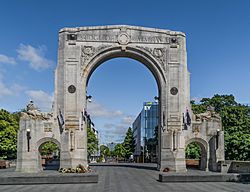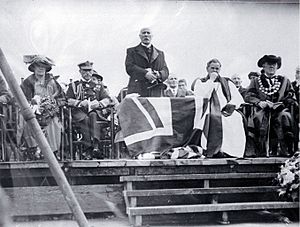Bridge of Remembrance facts for kids
Quick facts for kids Bridge of Remembrance |
|
|---|---|
| New Zealand | |

Bridge of Remembrance, Christchurch
|
|
| For New Zealand dead of World War I New Zealand dead of World War II |
|
| Unveiled | 11 November 1924 |
| Location | 43°31′59″S 172°38′00″E / 43.5331°S 172.6334°E |
| Designed by | William Gummer (architect) Frederick Gurnsey (stonemason) |
|
Quid non-pro patria
|
|
| Designated: | 2 April 1985 |
| Reference #: | 289 |
The Bridge of Remembrance is a special war memorial in Christchurch, New Zealand. It helps us remember the brave people who fought and died in World War I and World War II. It also honors those who took part in other conflicts like those in Korea, Malaya, Borneo, and Vietnam.
This important bridge is owned by the Christchurch City Council. You can find it on the Cashel Street Bridge, right at the start of the City Mall. After being damaged in the 2011 Christchurch earthquake, the bridge was fixed and made stronger. It reopened with a special ceremony on ANZAC Day in 2016.
Contents
Where is the Bridge of Remembrance?
The Bridge of Remembrance is an archway built over the eastern end of the Cashel Street bridge. This bridge connects Oxford and Cambridge Terraces over the Avon River.
Since ANZAC Day in 1977, the bridge has been a place just for people walking. It is not open to cars. To the east of the bridge, you will find the main shopping area and pedestrian mall. Close by, between the bridge and Victoria Square, are other interesting places like the Floral Clock and the Law Courts.
History of the Bridge
Building the Original Bridge
The first bridge over the Avon River at Cashel Street was built by Edward George Wright. He was a civil engineer and contractor. The bridge was finished in May 1873.
Idea for the Memorial Arch
The idea for a "Bridge of Remembrance" came from a letter to The Press newspaper. Mrs Wyn Irwin wrote this letter on 24 July 1919. Many people liked the idea, and it gained a lot of public support.

Construction of the memorial arch began on 23 January 1923. The first stone was laid on ANZAC Day, 25 April 1923. This was done by Lord Jellicoe, who was the Governor-General at the time.
Unveiling the Memorial
The Bridge of Remembrance was officially opened on 11 November 1924. This day is known as Armistice Day, which marks the end of World War I. Lord Jellicoe also unveiled the memorial.
This spot was important because soldiers from King Edward Barracks would cross the Avon River here. They would then march to the railway station to leave for war.
Changes and Repairs
In 1976, the bridge was closed to cars. Later, in 1982, the nearby Cashel Street also became a pedestrian-only area.
The bridge was damaged in February 2011 during the 2011 Christchurch earthquake. The repairs and strengthening work cost millions of dollars. The Returned Services' Association (RSA) was worried about the bridge. They feared it might be lost in another earthquake.
Repairs began in May 2013. The main structural work was finished by December 2015. The Bridge of Remembrance finally reopened to the public on ANZAC Day, Monday 25 April 2016.
Design of the Bridge
The design for the Bridge of Remembrance was created by William Gummer. He was part of the firm Prouse and Gummer. William Gummer also designed other important memorials in New Zealand.
The arch has a special message carved into it: Quid non-pro patria. This Latin phrase means, "What will a man not do for his country?"
The bridge has many symbolic features. These include a cross, torches, and laurel wreaths. There are also decorative lions carved by Frederick Gurnsey. These features help us remember the bravery and sacrifice of those who served.
Images for kids
-
Dignitaries at the opening (from left): Lady Jellicoe, Governor-General Viscount Jellicoe, Andrew Anderson, Bishop Churchill Julius and Mayor Henry Thacker
See also
 In Spanish: Puente del Recuerdo para niños
In Spanish: Puente del Recuerdo para niños
 | Shirley Ann Jackson |
 | Garett Morgan |
 | J. Ernest Wilkins Jr. |
 | Elijah McCoy |


